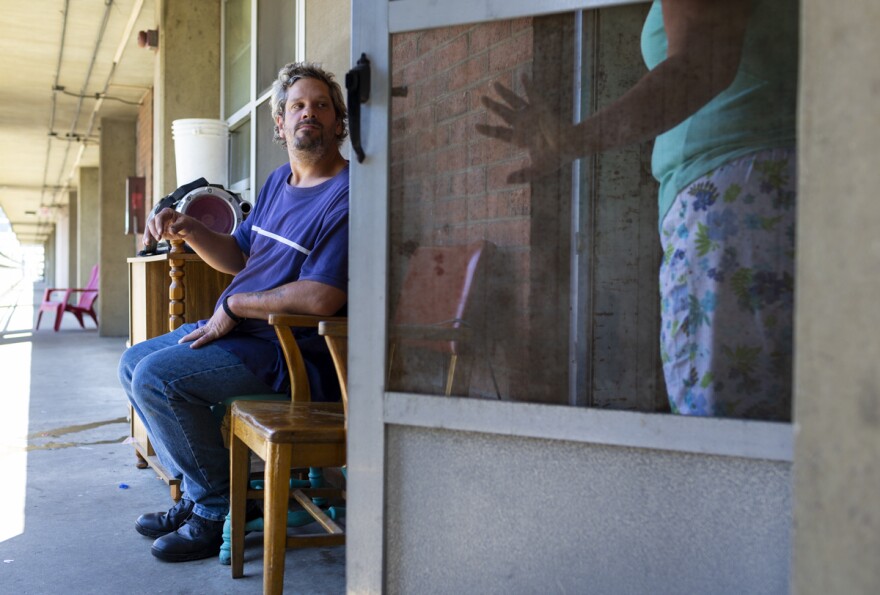Wendy Clark has known since 2007 that she’s allergic to bedbug bites.
While living in Nashville she got a bite, and had to go straight to the emergency room. These days, she takes a prescription antihistamine as a preventative measure, because last June, she and her husband Jimmy moved to Dosker Manor.
Like many of their neighbors in the sprawling public housing complex in downtown Louisville, their apartment is under constant threat of bedbug infestation.
Until recently, Clark and her husband Jimmy would often have friends over to their apartment to play cards or visit their new puppy. Bedbugs changed that.
“We invited some friends over and were playing cards. Her boyfriend decided to sit on the bed, and it was not even 20 seconds that Jimmy said, ‘Get up off that bed,'" Clark said.
"And two days later there was a bedbug on the bed. And that’s when I got the bite.”
After that bite, Wendy Clark developed a rash that went all the way around from her stomach to her back, and the couple slept on the floor for weeks. Now, they haven't seen a bedbug in the apartment for awhile, but they know their neighbors have them.
Jimmy Clark said the couple is limiting their social life to the outdoor hallways that lead to each apartment.
“I’m sorry, but I don’t want anyone over here," he said. "I’m afraid they’re going to bring bedbugs with them.”
Aninvestigation by the Kentucky Center for Investigative Reporting found bedbug complaints are frequent among Dosker Manor residents. And though people complain to both the housing authority and the city, little coordination exists between the two to address the problem. In the past two and a half years, nearly 1,200 bedbug complaints have been filed by residents living in more than half of Dosker Manor’s units.
A Harmless Nuisance?
For most people who aren’t allergic to bedbug bites, the pests are mostly considered a nuisance bug. Luz Fernandez, a doctor at a University of Louisville primary care clinic, said most studies show that bedbugs are ultimately harmless and are not known to cause disease.
“Certainly if they were a vector of a more severe disease there’d be an outcry for eradication," Fernandez said. "But since at this point, they fall more into the category of nuisances, maybe that’s why it hasn’t gotten the attention that other things have.”
But research is beginning to show there might be more to bedbugs than just an inconvenience. North Carolina State researcher Zach DeVries’ hypothesis is that bedbugs either cause asthma or make other household allergens that trigger asthma even worse.
He conducted a recent study in Raleigh that found histamine levels in homes with bedbug infestations were about 20 times higher than histamine levels in homes with no history of bedbugs.
“We found that histamine is there and in high quantities," DeVries said. "Even after getting rid of bedbugs it sticks around for at least three months.”
Humans usually release histamines as part of an immune response, but they can cause allergic reactions, too. This is why antihistamines help with symptoms of allergies.
DeVries found there were also high levels of histamines in bedbug feces. His team is now expanding the study to include even more homes. He’s hoping to study related issues in the future, like whether there’s a correlation between bedbugs and asthmatic attacks, missed work due to respiratory disease, or visits to the emergency room.
“The one saving grace that we always tell people with bedbugs is that they’re not transmitting diseases and they're not a harm to you like cockroaches and other things that are involved in allergic disease,” DeVries said. “We potentially may have to change that and modify what we’re telling people.”
Continued Research
There’s also research into whether bedbugs could potentially carry parasites and infect humans with diseases. Scientists know that a similar bug carries Chagas disease — an infectious disease caused by a parasite found in the feces of the triatomine bug — and has infected humans in Peru.
Now, University of Pennsylvania researcher Michael Levy is studying whether bedbugs can also be vectors for disease.
“We took the feces from bedbugs, put it on the mice, and were able to show that the parasite in bedbugs can transmit the usual way, through feces," Levy said.
Levy’s current research focuses on whether bedbugs are actually transmitting disease in the real world, outside a lab.
“We’re currently trying to test bedbugs in the houses of people with Chagas disease to see if they’re picking up the parasite in the wild, i.e. in people’s bedrooms," he said.
Levy cautions that his research is still in early stages. But he said public agencies not dealing with bedbugs is an issue nationwide, and the only way that’ll change is when they’re pressured to do so.
Meanwhile, Jimmy and Wendy Clark live with constant worry that bedbugs are going to show up again in their apartment. They have nowhere else to go but where they are now. Jimmy Clark said he’s been homeless before and lived in shelters and on the street – he doesn’t want to do that again.
Dosker Manor has provided a home for the newlyweds to start a life together – for Jimmy to watch "This Old House" and upholster thrown-away chairs, a place to feel safe. But the bedbugs threaten that safety.
“It ain’t gonna stop in this place until the buildings are on the ground. Because they’re living in the walls,” Jimmy Clark said.









